The health precautions when traveling abroad are never too many, and even though, our government has always tried to be one step ahead so that our visitors can enjoy healthy travel in Costa Rica, it is important to talk about some important health precautions especially when talking about malaria, dengue and similar diseases caused by mosquitoes.

Costa Rica is a tropical country. This means great weather, fantastic biodiversity, breathtaking landscapes, and, unavoidably, mosquitoes and, thus, diseases. The country has had a long and successful fight against malaria, dengue, zika, and other similar illnesses; however, the sprouts always appear, especially in the rainy season. Keep on reading to learn how to evade the bothersome mosquitoes, the most dangerous creatures in the world!
You will be able to prevent bites and treat bites if they occur by taking the precautions outlined on this page.
Risks of Mosquito Bites
Mosquitoes bite humans to feed on your blood. During this process, they can infect you with diseases such as:
- Malaria
- Dengue fever
- Zika
- Chikunguya
When mosquitoes bite, they cause a small, itchy red bump on your skin. Some people develop an allergic skin reaction to the bites, and the bumps become large. Scratching the bites can lead to bacterial infections developing on the skin.
Different types of mosquitoes feed at different times of the day, both indoors and outdoors. And especially when you go hiking in the diverse national parks and reserves that Costa Rica offers. Consequently, you should take precautions to prevent your family and friends getting bitten.

Avoiding mosquito bites
When talking about healthy travel in Costa Rica, think about how you’ll protect yourself from mosquito bites. This involves:
- Using top grade bug repellents.
- Wear appropriate attire to protect your skin from bites.
- Use a mosquito net.
- Reducing the number of mosquitoes in and around your accommodations
You should also be aware of how to treat bites if they occur.

Insect Repellents
Insect repellents do not kill mosquitoes, but they can prevent them from settling on and biting your skin. They protect against several types of bug bites.
In general, insect repellents should include:
- applied to all exposed skin that is not covered by clothes.
- administered after sunscreen (be aware that the repellent may lessen the protection provided by your sunscreen; thus, apply sunscreen with 30-50 SPF to assure protection).
- Reapply frequently, especially if you spot mosquitos flying near to or landing on your skin.
- Reapply after swimming, washing, or extreme sweating.
- Apply softly to the cheeks and eyes. Take cautious not to breathe in the repellant. If using a spray, apply it to your palms and then rub it over your face, avoiding your eyes.
- Avoid synthetic clothing or plastics that may cause harm, such as credit cards, phones, watches, or eyewear.
Insect repellents come in a range of brands and strengths. In general, the stronger the repellent, the longer you should be able to avoid being bitten before reapplying it. When properly applied to the skin, repellents should give many hours of protection. Always follow the precise directions on the repellent packaging for how frequently to reapply.

Effective repellents should have one of the following active ingredients:
- DEET (N,N-diethyl-m-tolumide)
- This is the most efficient insect repellant.
- can be securely used on babies older than two months, pregnant ladies, and nursing mothers.
- In malaria-infested locations, a 50% dosage of DEET is advised.
- Lower concentrations (for example, 30% DEET) will require more frequent reapplication.
- DEET concentrations more than 50% should never be used on the skin, but can be sprayed on clothes for further protection.
- Icaradin (picardin)
- To guard against mosquito-borne illnesses, use a minimum of 20% concentration.
- Eucalyptus citriodora oil, hydrated and cyclized.
It must be at least 30% concentrated to be effective (30% offers just 4-6 hours of protection).- requires more frequent reapplication than 30% DEET.
- Seek immediate medical assistance if accidentally administered to the eyes.
- IR3535
- Less effective than DEET or Icaridin in preventing bites from malaria-carrying mosquitoes.
- should not be used in regions where malaria is prevalent.
Always read and carefully follow the manufacturer’s directions for any insect repellant you purchase.
Oil of Citronella products are only effective for a limited period of time and should not be relied on to prevent mosquito and bug bites. Other ways that don’t work and should not be depended on include:
- Apply tea tree oil (or other homeopathic medicines) to your skin.
- Taking B1 and B12 supplements
- Consuming garlic or yeast extracts, or applying them on your skin
- Using Bath Oils and Skin Softeners
- Drinking booze.
- Using electric buzzers or mobile phone applications that generate high-frequency sound waves.
Clothing
Clothing prevents mosquitoes from attacking your skin. Mosquitoes cannot bite through loose clothes, but they may if it is tight against your skin. Clothing may be thin in hot areas, as long as it is loose. Any exposed skin should be treated with insect repellent.
In this time of year though, it is convenient to put repellent before you dress up and after the shower, and then put some more over the clothes.
Consider pairing loose-fitting apparel with:
- A high neckline.
- Long sleeves.
- Long trouser legs, skirt, or dress.
- socks
Clothing can be treated (by washing or spraying) with pesticides like Permethrin, which kills insects when they fall on the fabric.
- Outdoor/travel vendors sell insecticide kits and sprays; please follow the manufacturer’s recommendations.
- Clothes that have previously been insecticide-treated can be purchased.
- Frequent washing of garments causes the pesticide to stop functioning.

Mosquito Nets
A mosquito net acts as a barrier, keeping mosquitos and other insects from contacting your skin while you sleep or relax. The barrier is more effective if the net has been coated (impregnated) with pesticide.
Nets can be retreated; follow the manufacturer’s directions when washing or treating bed nets with pesticides.
Mosquito nets come in a variety of forms and shapes and may be used both indoors and outdoors. It is critical to select a net that is appropriate for your specific travel needs.
How to use a mosquito net.
Before you use the net, make sure there are no holes. If a hole is visible, it can be repaired with, for example, a needle and thread.
To prevent insects from flying beneath and entering the net, tuck it under your mattress or ground sheet at night and either collapse or keep it tucked up during the day.
Mosquitoes may still bite through the net, so make sure your skin does not lay directly against it. This opportunity is diminished if your net has been treated with pesticide.
Reducing mosquitoes in and around your accommodations
You may limit the risk of mosquitos invading your lodging by using:
- Air conditioning
- Insects are rare to infiltrate spaces when air conditioning is applied correctly and consistently.
- If you have air conditioning, you do not need to use a mosquito net.
- To operate the air conditioning, windows and doors must be kept closed.
- Mosquito screens
- Mesh screens on windows and doors should be inspected for holes that might allow insects to pass through and fixed.
- Screens should be maintained closed at all times to prevent insects from entering the room.
- An insecticide spray or plug-in should also be applied.
- Fans
- Usually if there is a fan directed to the bed, it will prevent mosquitoes to get closer to you. However it doesn’t avoid them as much as the air conditioned.
- Insecticide (pyrethroid) products
- Plug-in devices employ electricity to gradually release pesticide from a liquid or pill into your home.
- They do not give adequate protection against bites on their own, but they can be used in conjunction with mosquito nets and/or insect screens.
- They will not operate with an unstable power supply.
Insect repellent candles, methylated burners, cones, and coils can be used in the absence of power, but not indoors.
Reducing mosquitos outside of your accommodation
Mosquitoes deposit eggs in water. Even a modest amount of water in a flower pot, a bucket, or a tree hole is sufficient. Mosquitoes cannot reproduce without water sources.
- To decrease the possibility for mosquitoes to develop, try to avoid leaving pools of water outside your hotel.
In tropical places where mosquitos are a concern, nesting grounds are frequently treated with pesticide.

Treating mosquito bites.
Scratching an uncomfortable bite can harm the skin and lead to infection. Reducing itchiness can assist to avoid this. Applying a cool cloth to the bite might help relieve the itch.
If you are aware that your skin reacts negatively to bites, try obtaining a bite relief lotion or antihistamine tablets before your trip.
- ‘Bite relief’ lotions and ointments may be purchased at pharmacies and supermarkets. When applied on bites, they often contain steroids (such as hydrocortisone) and/or antihistamines, which relieve redness and itch.
- Taking an antihistamine pill on a regular basis helps to relieve the irritation from bites. You must consult a pharmacist, doctor, or travel health counselor about the propriety of taking them.
Resources
Further information on protecting yourself against insect bites is available on the Bug Off website
Reference:
This articles is based on:
Public Health Scotland. (2024). Mosquito Bite Avoidance – Fit for Travel. Fitfortravel.nhs.uk. https://www.fitfortravel.nhs.uk/advice/malaria/mosquito-bite-avoidance
